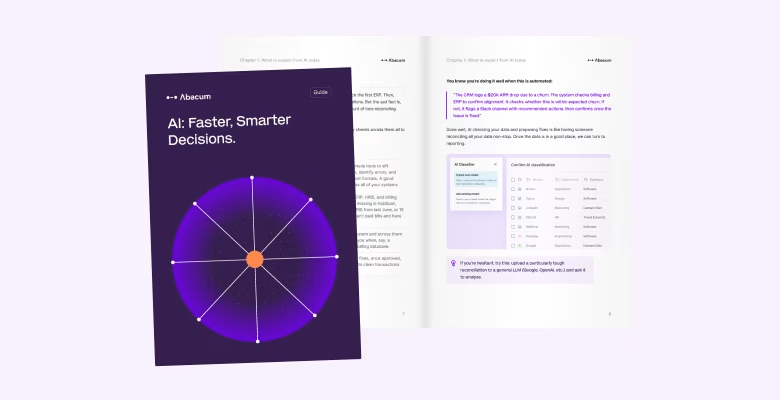
In nearly every corner of the professional world, AI’s growing prominence is sparking the same question – could this role be automated out of existence?
In the case of the finance department, the short answer is a resounding no. That doesn’t, however, mean that AI won’t irreversibly change it. If anything, it arguably already has. This shift represents a rare opportunity for finance professionals to elevate their role and drive more value than ever before.
Over the last decade, the finance department’s remit has increasingly expanded. The days when it was viewed solely as the home of budgets, forecasts, and compliance are firmly in the rearview mirror. Today, especially in high-growth companies, finance teams are expected to play a critical role in performance management and strategic planning.
I recently spoke to the CFO in one such high-growth business who summed the status quo up perfectly: “We’re no longer just stewards of the numbers. We’re performance leaders.” This evolution is tantamount to understanding AI’s role in this context. Instead of posing a threat to the finance function, it can in fact act as a catalyst to accelerate its transformation and scale its impact across a business.
AI is greasing the wheels of the finance department’s value proposition
Finance teams are frequently embedded in the wider operational structure in high-growth environments. Modeling different growth scenarios, evaluating strategic initiatives, and advising the leadership team on everything from hiring plans to pricing strategy are all mainstay features of their day-to-day role. Doing all this well requires real-time visibility into the data. This is where AI is worth its weight in gold.
Machine learning and AI tools are capable of processing vast quantities of financial and operational data, identifying patterns and trends, and uncovering insights that would have historically taken a human hours (if not days) to surface. Consequently, the majority of the finance department’s time is no longer spent on wrangling through spreadsheets or reconciling data sources. But rather they can focus on analysis, interpretation, and supporting key business decisions.
Aligning on strategy beats automation for the sake of it
That said, not all automation is created equal. The most effective finance teams aren’t just adopting AI tools as cost-cutting or time-saving measures. They’re using them to better align with business strategy more holistically.
For example, automating invoice processing is one thing, but using AI to connect financial data with important operational metrics is quite another. Said metrics help other functions understand how every business decision affects cash flow, runway, profitability etc. Finance teams need to speak the language of the wider business to become a genuine strategic partner – real humans need to be implementing and scrutinising this process.
The finance teams that thrive in the AI era will be those who deeply understand how their work intimately connects to the broader business’ goals. Automating for the sake of it isn’t the way forward. They will need to carefully select the tools that help them become more proactive, insightful, and ultimately, influential.
Decision-making should always be human led
Despite its many strengths though, AI lacks one critical quality – judgement. Yes, it can summarise trends, highlight anomalies, and even propose actions to fix a problem. But it simply cannot understand context in the way a human can. It doesn’t appreciate the nuance of internal politics, market conditions, or brand reputation, and it definitely shouldn’t be left alone to handle regulatory submissions or navigate grey areas in accounting discrepancies.
There is a chasm between using AI to inform decisions and letting it make them for you. Finance is the department that deals in the most highly sensitive and confidential business information. While an AI-generated email with a typo wouldn’t batter an eyelid, an AI-generated error in tax reporting could be disastrous.
This is why finance professionals aren’t going anywhere. Their ability to apply experience, context, and sound judgement to complex scenarios is truly irreplaceable. The introduction of AI doesn’t change this. What it does change is the scope and scale of what they can deliver.
Welcoming the opportunity
AI is unequivocally here to stay, and it’s already reshaping how the finance function operates. It may not pose a threat to it, but it is a tool that can have a varying degree of impact. Like any tool, said impact depends on where and how well it is used.
The finance department’s future relationship with AI needs to be collaborative, not competitive. Not only does it need to be open to the technology’s potential, but it also needs to carefully consider its deployment. Finance professionals who invest the time to understand how AI works, and thus where it adds the most value, will only increase their career capital.
Finance has already transcended its stereotype. It is no longer a back-office function responsible for keeping the books in order. It’s now a forward-looking business partner helping to steer the ship, with AI helping to keep the wind in its sails.




